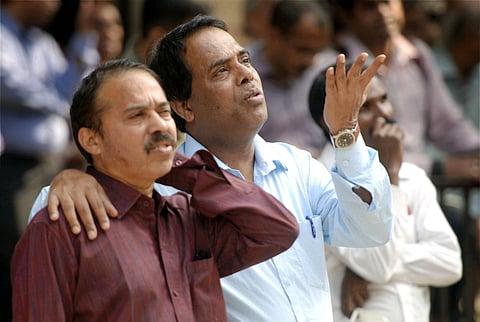

Global markets are on the dragon's tail with the Sensex to S&P, Dow Jones to Nikkei seeing a Friday bloodbath over fears of the coronavirus becoming a pandemic.
In other words, we are staring at a clear and present danger causing severe human and economic upheaval, but are ill-equipped to contain the calamity.
More than the US-China trade war stabbing economies in the back, the coronavirus that came out of nowhere is twisting the knife straight up and deeper into the global being, stoking recessionary fears.
Because, everything from supplies of dragon fruit from China to the Tokyo Olympics in July may bite the dust, even as the already blanched global aviation, tourism and trade run the risk of getting charred beyond repair.
Predictably, the Bank of America believes the global economy will see its weakest year since the peak of the 2008 financial crisis fearing market disruption, while ratings agency Moody's says the coronavirus pandemic may trigger global and US recessions in the first half of the year.
The pessimistic predictions are proving costly for markets, which too are headed for the worst week since the 2008 crisis, crashing 10 per cent on Friday from this month’s peak.
While the Sensex crashed as much as 1200 points with investors losing out Rs 5 lakh crore in just one hour after the market opened, Japan's Nikkei was down over 4 per cent, Hong Kong's Hang Seng 2.8 per cent, Korea's Kospi 3 per cent and Shanghai composite lost 3.8 per cent -- the worst week since 2008.
"If you see the Dow Jones, in the last 6-7 sessions, it's fallen close to 3,000 points, while the S&P crashed 10 per cent, which is a record high in six days. Since the 2008 crisis, this is the first time this is happening," said Prasanna Tantri, Assistant Professor, Executive Director of the Centre for Analytical Finance, ISB.
During such times, market pundits favour dip-buying, but it appears, there's no such appetite. That's because no one knows how long the virus outbreak will last or how severe it will get.
"The thing about markets is, people are sitting on profits. We've had a good rally before the crash and even mid-caps have started rallying and investors would want to sell profits. But nobody knows what the real damage is if it's a one-quarter issue or more," Tantri said.
Countries are sending out scary signals with Japan shutting down schools and sports events, while elsewhere, Microsoft and Facebook scrapped major events. A Reuters estimate showed 10 countries reporting their first virus cases in the past 24 hours, including Nigeria.
Expectations of the US Federal Reserve and other central banks cutting interest rates to cushion the blow are intense though analysts fear if such a policy is an effective tool. Last year's evidence tells us that monetary policy has somewhat lost its power over economic revival.
The virus has so far mainly battered China, causing nearly 80,000 infections and almost 2,800 deaths, according to official Chinese figures. It has spread to another 46 countries, where about 3,700 cases and 57 deaths have been reported, according to the WHO.
Meanwhile, there's a mixed feeling on whether India will take a hit.
"India will do relatively better because our connection to China or even global trade isn't that high. India may be a beneficiary also, but that's all medium and long term. As long as the panic exists and we have news of new countries getting affected, volatility will continue," he said.
But Praveen Khandelwal, General Secretary of Confederation of All India Trade (CAIT), believes it may take at least six months to restore normalcy.
"Bilateral trade ties between India and China are far more extensive and wide-ranging than generally understood. Dependence on China for supplies spans across sectors and sub-sectors, and in many cases is as high as 60 per cent. The situation on the ground indicates that normalization of trade can take at least six months," he said.